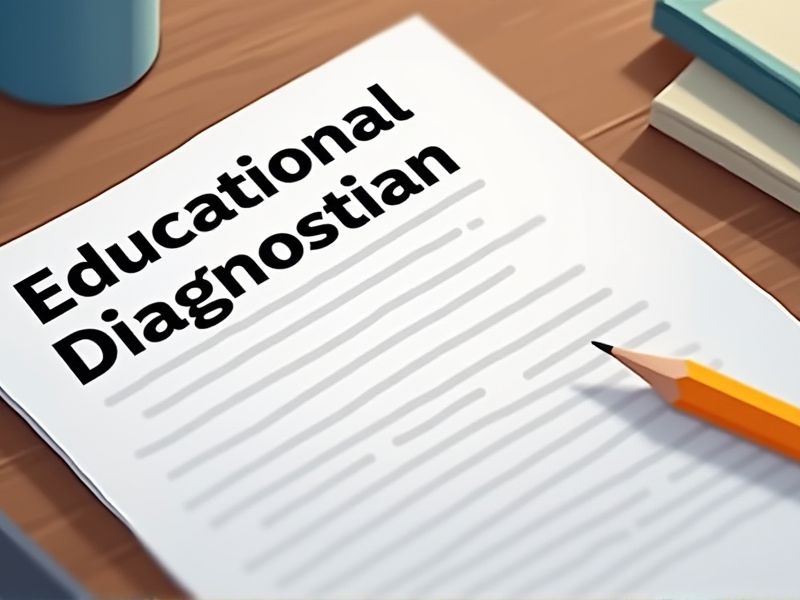
Educational diagnosticians play a critical role in assessing and identifying learning disabilities, necessitating stringent qualifications to ensure accurate evaluations and educational planning. Having specific certifications can enhance their expertise in testing methodologies and interpretation of diagnostic data, directly influencing the quality of service delivery. The specialized nature of their work demands a deep understanding of educational psychology and legal requirements, attainable through targeted certification programs. Essential certifications help build a foundation for skill and knowledge, vital for the role of an Educational Diagnostician.
State Educational Diagnostician Certification
State Educational Diagnostician Certification ensures that educational diagnosticians possess the necessary skills and knowledge to accurately assess student learning needs. This certification standardizes the qualifications across the state, fostering consistency in diagnostic practices within schools. It provides credibility, reassuring parents and institutions that the diagnostician is professionally competent. Without certification, disparities in diagnostic accuracy and service quality could arise, potentially affecting student outcomes.
Nationally Certified School Psychologist (NCSP)
The Nationally Certified School Psychologist (NCSP) designation ensures that an individual possesses the necessary skills and knowledge to assess and support students' diverse learning needs, which is essential for an Educational Diagnostician. Educational Diagnosticians benefit from the expertise of an NCSP when identifying and addressing learning disabilities and mental health issues in a school setting. Collaborative processes in schools require professionals capable of providing comprehensive evaluations, and the NCSP certification equips diagnosticians with the competencies to fulfill this role effectively. School systems prefer professionals with NCSP credentials to ensure they are following evidence-based practices in evaluating and fostering student success.
Certified Special Education Teacher Credential
The Certified Special Education Teacher Credential provides specialized training in understanding diverse learning needs and effective teaching strategies. This foundational knowledge equips educational diagnosticians to accurately assess and identify special education requirements. The credential ensures familiarity with legal guidelines and ethical considerations in educational evaluations. With this expertise, diagnosticians can develop tailored educational plans that enhance student learning outcomes.
Certified Learning Disabilities Specialist (CLDS)
The need for Certified Learning Disabilities Specialists (CLDS) among Educational Diagnosticians stems from their expertise in identifying and understanding specific learning disabilities. Their specialized training allows them to implement tailored educational strategies that meet the unique needs of each student, enhancing learning outcomes. They offer in-depth assessments that provide more accurate diagnoses, ensuring students receive appropriate interventions. Schools benefit from their insights, which help in developing inclusive education plans and improving overall academic performance.
Certified Educational Evaluator (CEE)
Certified Educational Evaluators (CEE) provide objective assessments that aid educational diagnosticians in identifying learning disabilities accurately. The involvement of CEEs helps ensure evaluators use standardized methods, leading to valid and reliable educational assessments. Educational diagnosticians utilize the data from CEEs to tailor specific interventions, addressing unique student needs effectively. The collaboration between CEEs and educational diagnosticians enhances the overall educational support system, promoting student success.
Certification in Applied Behavior Analysis (ABA)
A certification in Applied Behavior Analysis (ABA) equips educational diagnosticians with the necessary skills to effectively assess and devise interventions for students with behavior-related challenges. By understanding the principles of ABA, diagnosticians can make informed decisions about behavior modification techniques that support students' learning and growth. Research shows that ABA interventions significantly improve educational outcomes for students with developmental disorders, strengthening the diagnostician's role in special education. This certification also ensures that diagnosticians adhere to ethical standards and implement evidence-based practices in educational settings.
Certified Dyslexia Practitioner
Educational diagnosticians often encounter students with dyslexia, requiring specialized intervention strategies. Certified Dyslexia Practitioners possess targeted expertise in identifying and addressing dyslexia, enhancing diagnostic accuracy. This specialized knowledge improves the development of individualized education plans tailored to students' specific learning needs. Integration of certified practitioners ensures evidence-based methodologies are applied, increasing educational outcomes for students with dyslexia.
Certification in Response to Intervention (RTI) Strategies
Certification in Response to Intervention (RTI) Strategies equips educational diagnosticians with the necessary skills to effectively identify students' specific learning needs. This training enables evidence-based interventions, ensuring targeted support that fosters academic progress. Without such certification, gaps in diagnosing and addressing learning disabilities may persist, resulting in less effective educational outcomes. Data shows that schools implementing RTI with trained personnel report significant improvements in student achievement and reduced special education referrals.
Universal Design for Learning (UDL) Certification
Universal Design for Learning (UDL) Certification equips educational diagnosticians with strategies to tailor assessments and interventions to diverse student needs, creating a more inclusive learning environment. Certification ensures diagnosticians are adept at applying UDL principles, maximizing student engagement and success. Training in UDL enables these professionals to identify and mitigate barriers to learning, which enhances instructional effectiveness. Adopting UDL practices promotes equitable education by allowing diagnosticians to support personalized learning pathways.
Assistive Technology in Education Certification
Educational diagnosticians require a nuanced understanding of diverse learner needs; assistive technology in education certification equips them with the tools to personalize learning strategies effectively. The growing diversity in classroom environments necessitates that diagnosticians can identify and implement technology that supports students with disabilities, enhancing educational outcomes. Integrating assistive technology into diagnostic assessments ensures that educators can recognize and bridge gaps in learning at an early stage. As educational policies increasingly emphasize inclusivity, such certifications prepare diagnosticians to meet legal and ethical standards while maximizing student potential.
Summary
By obtaining certifications, you enhance your ability to assess student learning needs more effectively. Certifications provide you with specialized skills and up-to-date knowledge, aiding in accurate student evaluation. These credentials often increase your credibility, potentially leading to career advancement and professional recognition. With improved skills, you can implement more personalized educational strategies, benefiting student outcomes.
